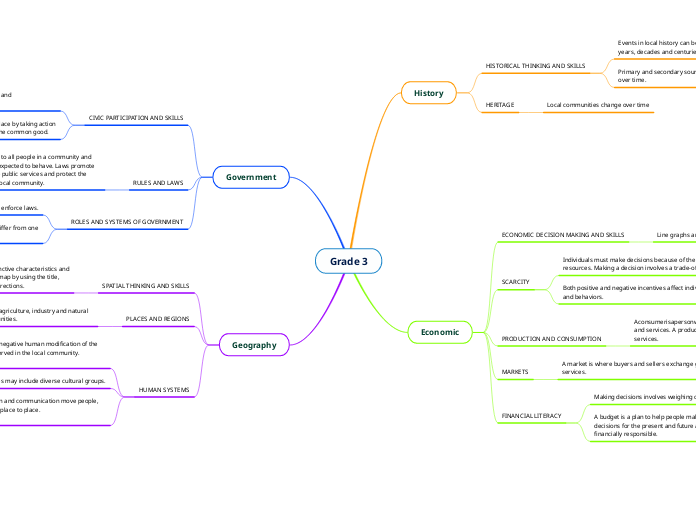Grade 3
History
HISTORICAL THINKING AND SKILLS
Events in local history can be shown on timelines organized by years, decades and centuries.
Primary and secondary sources can be used to show change over time.
HERITAGE
Local communities change over time
Economic
ECONOMIC DECISION MAKING AND SKILLS
Line graphs are used to show changes in data over time.
SCARCITY
Individuals must make decisions because of the scarcity of resources. Making a decision involves a trade-off.
Both positive and negative incentives affect individuals’ choices and behaviors.
PRODUCTION AND CONSUMPTION
Aconsumerisapersonwhosewantsaresatisfiedbyusing goods and services. A producer makes goods and/or provides services.
MARKETS
A market is where buyers and sellers exchange goods and services.
FINANCIAL LITERACY
Making decisions involves weighing costs and benefits.
A budget is a plan to help people make personal economic
decisions for the present and future and to become more financially responsible.
Government
CIVIC PARTICIPATION AND SKILLS
Members of local communities have rights and responsibilities.
Individuals make the community a better place by taking action
to solve problems in a way that promotes the common good.
RULES AND LAWS
Laws are rules which apply to all people in a community and describe ways people are expected to behave. Laws promote order and security, provide public services and protect the rights of individuals in the local community.
ROLES AND SYSTEMS OF GOVERNMENT
Governments have authority to make and enforce laws.
The structure of local governments may differ from one
community to another.
Geography
SPATIAL THINKING AND SKILLS
Physical and political maps have distinctive characteristics and purposes. Places can be located on a map by using the title, key, alphanumeric grid and cardinal directions.
PLACES AND REGIONS
Daily life is influenced by the agriculture, industry and natural resources in different communities.
HUMAN SYSTEMS
Evidence of positive and negative human modification of the environment can be observed in the local community.
Communities may include diverse cultural groups.
Systems of transportation and communication move people, products and ideas from place to place.
